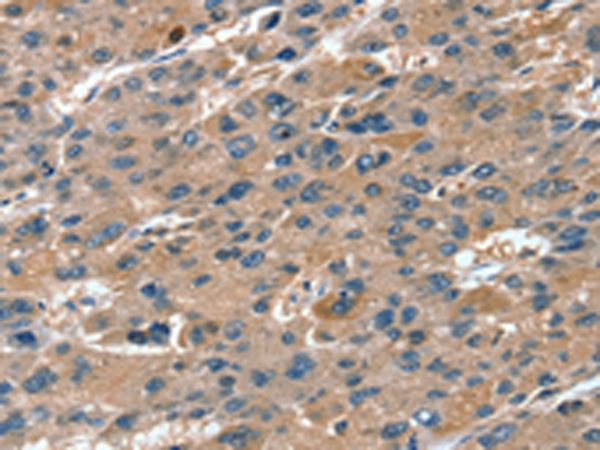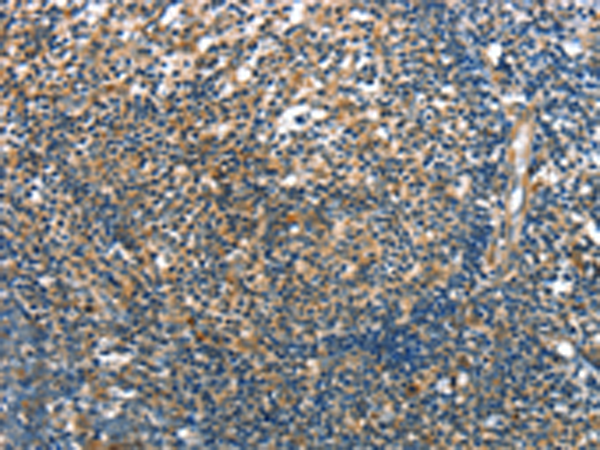

| WB | 咨询技术 | Human,Mouse,Rat |
| IF | 咨询技术 | Human,Mouse,Rat |
| IHC | 1/20-1/100 | Human,Mouse,Rat |
| ICC | 技术咨询 | Human,Mouse,Rat |
| FCM | 咨询技术 | Human,Mouse,Rat |
| Elisa | 1/2000-1/5000 | Human,Mouse,Rat |
| Aliases | SAG; ROC2; CKBBP1 |
| Host/Isotype | Rabbit IgG |
| Antibody Type | Primary antibody |
| Storage | Store at 4°C short term. Aliquot and store at -20°C long term. Avoid freeze/thaw cycles. |
| Species Reactivity | Human, Mouse |
| Immunogen | Fusion protein of human RNF7 |
| Formulation | Purified antibody in PBS with 0.05% sodium azide and 50% glycerol. |
+ +
以下是3篇关于RNF7抗体的文献摘要信息,供参考:
1. **文献名称**: *ROC2 interacts with cullin-1 to modulate ubiquitin ligase activity*
**作者**: Ohta T, et al.
**摘要**: 本研究首次证明RNF7(ROC2)作为Cullin家族(如Cul1和Cul2)的结合蛋白,通过抗体验证其在SCF(Skp1-Cullin-F-box)泛素连接酶复合体中的调控作用,揭示其参与底物泛素化及蛋白酶体降解通路。
2. **文献名称**: *RNF7 promotes colorectal cancer progression by ubiquitinating and degrading p53*
**作者**: Zhang Y, et al.
**摘要**: 通过免疫组化(使用RNF7抗体)和功能实验,发现RNF7在结直肠癌中高表达,其通过泛素化修饰p53并促进其降解,从而抑制肿瘤细胞凋亡并加速癌症发展。
3. **文献名称**: *RNF7 regulates β-amyloid accumulation by modulating the stability of BACE1*
**作者**: Zhou L, et al.
**摘要**: 研究利用RNF7抗体进行免疫共沉淀(Co-IP)和Western blot分析,发现RNF7通过调控β-分泌酶(BACE1)的稳定性,影响阿尔茨海默病中β-淀粉样蛋白的生成和神经元毒性。
4. **文献名称**: *Transcriptional regulation of RNF7 by NF-κB in hepatocellular carcinoma*
**作者**: Li H, et al.
**摘要**: 通过染色质免疫沉淀(ChIP)结合RNF7抗体,证实NF-κB直接结合RNF7启动子区并上调其表达,促进肝癌细胞增殖和侵袭,提示RNF7作为潜在治疗靶点。
以上文献均涉及RNF7抗体在机制研究中的应用,涵盖癌症、神经退行性疾病等领域。如需具体期刊信息,可进一步提供PMID或DOI。
RNF7 (Ring Finger Protein 7), also known as COP9 signalosome subunit 3 (CSN3), is a key component of the COP9 signalosome complex, which regulates cellular processes like protein degradation, DNA repair, and cell cycle control. This ubiquitously expressed protein contains a conserved RING finger domain, enabling its role in ubiquitination—a post-translational modification critical for protein stability, localization, and interactions. RNF7 interacts with cullin proteins to modulate the activity of cullin-RING ubiquitin ligases (CRLs), influencing pathways such as apoptosis, stress response, and tumorigenesis.
Antibodies targeting RNF7 are essential tools for studying its expression, function, and regulatory mechanisms. They are widely used in techniques like Western blotting, immunohistochemistry, and immunoprecipitation to explore RNF7's involvement in diseases. Research links RNF7 dysregulation to cancers (e.g., breast, lung) due to its role in promoting oncoprotein stability or degrading tumor suppressors. It is also implicated in neurodegenerative disorders and immune responses. Additionally, studies highlight its interaction with viral proteins, suggesting a role in host-pathogen interactions. RNF7 antibodies thus aid in unraveling its therapeutic potential as a biomarker or drug target, though its dual roles in pro-survival and stress-response pathways require careful contextual analysis.
×